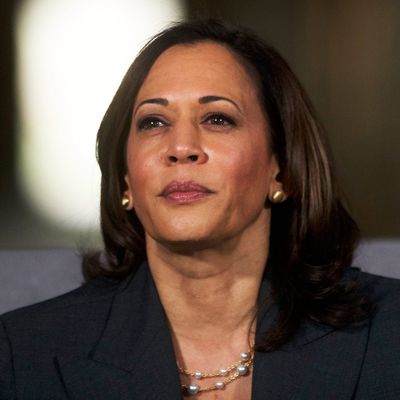
Kamala Harris should have been a contender. In the summer of 2017, the California senator was the toast of the Hamptons and new queen of the Clintonites. From the earliest days of her candidacy, Harris boasted the enthusiastic support of Hillary’s donor network and supporters, warm relations with Obamaworld, and the sympathies of a broad range of Democratic lawmakers in the nation’s largest state and beyond. When Harris withdrew from the race Tuesday, she was second only to Joe Biden in FiveThirtyEight’s “endorsement primary.”
If America’s political parties were still strong enough to anoint their own standard-bearers in smoke-filled rooms (and/or wine-soaked patios), Harris would be on her way to a presidential nomination. Instead, she’s cutting her losses and fortifying her defenses against a hypothetical primary challenge in 2022.
The Democratic Establishment may finally be reconciling itself to Joe Biden. But the former vice-president had to maintain a large lead over the field for months before his party’s donors began moving sharply his way. And even now, significant factions refuse to accept that a 77-year-old white guy who’s rambly beyond his years is their best bet for fending off the Democratic left (thus, we all now know the name of the mayor of South Bend). One reason why Barack Obama tapped Biden as his running mate in the first place was that he was looking for a wingman, not an heir apparent — and the idea of Uncle Joe running for the presidency at age 74 appeared self-evidently absurd. The party’s Pooh-Bahs may settle for an even older Biden, but only if the rank and file leaves them no other choice.
Harris was the one they wanted. She offered oratorical talent, a national political identity still inchoate enough to be remodeled to the demands of the moment, and an opportunity to make history. She appeared progressive enough to appease the left, and pragmatic enough to ease the corporate wing’s economic anxieties. But none of that mattered much, in the end.
Multiple suspects are implicated in Kamala 2020’s premature death. The autopsies began while its heart was still beating: Over the weekend, the New York Times curated the mutual recriminations of her campaign’s warring factions. Whoever was truly at fault, there appears to be little disagreement that her operation was poorly managed. But the Harris team’s idiosyncratic failings can’t explain why Cory Booker, Amy Klobuchar, and other conventionally qualified Democratic candidates have been polling behind her. A separate explanation for Harris’s woes is that, in the Trump era, Democratic voters have developed a more conservative conception of electability than the party’s elites. After the trauma of 2016, perhaps many primary goers feel that nominating an African-American or a woman — let alone an African-American woman — would be tempting fate. But while there is almost certainly some truth to this assessment, it also cannot explain why the two candidates who most violently defy the conventional wisdom about “electability” — the Jewish socialist Bernie Sanders, and female anti-corporate crusader Elizabeth Warren — remain poised to compete in Iowa and beyond.
Thus, Harris’s improbable collapse, along with the failure of Booker or Klobuchar to ever launch, seems indicative of something larger than their individual liabilities — namely, the weakness of modern American political parties as institutions. Booker has won more coveted endorsements than Bernie Sanders, and Klobuchar has claimed more than Pete Buttigieg. But each has mustered only a small fraction of the socialist senator’s or South Bend mayor’s support. Harris’s fundamental problem was that her campaign was rich in a depreciating currency. What looked like the potency of Establishment signaling in 2016 may have actually been the power of mere familiarity: Democratic base voters tend to admire the party’s most prominent leaders, and many are happy to default to a familiar face. For this reason, Biden has managed to coast on name recognition and goodwill. But Establishment support without national renown doesn’t seem to count for much.
In the land of weak parties, mass media is king. Politics Twitter may be wildly unrepresentative of the Democratic electorate. And Harris’s campaign may have erred by failing to appreciate that fact. But her candidacy’s demise reveals that catering to the tastes of the Twitter left is nevertheless perfectly rational. Those bundlers in the Hamptons failed to provide Harris with a steady supply of campaign cash. Sanders’s and Warren’s ideologically motivated, extremely online small-dollar armies by contrast have kept their coffers full. Meanwhile, Buttigieg got off the ground by accepting — and “acing” — absolutely every earned media opportunity that came his way. And in the past week, Michael Bloomberg managed to buy himself the same level of national support as Harris by dropping a recording-breaking $30 million on television ads. In many respects, Donald Trump’s 2016 triumph may prove sui generis. But in demonstrating that media dominance can compensate for a total dearth of intraparty support, the mogul’s first campaign gave us a preview of the new normal.
All of which is to say, the main lesson of Harris’s failure may be this: If you enter a presidential race without celebrity status, unique credibility among your party’s most engaged and ideological activists, billions of dollars in personal wealth, or a preternatural gift for charming white journalists and Iowa grandparents, you are going to have a hard time keeping your campaign funded — no matter how warmly you’re celebrated on Capitol Hill or Martha’s Vineyard.






























